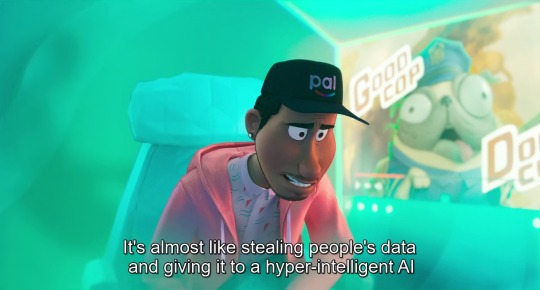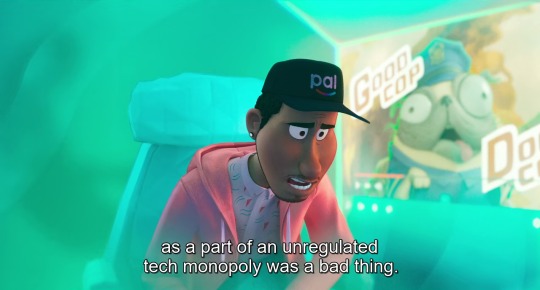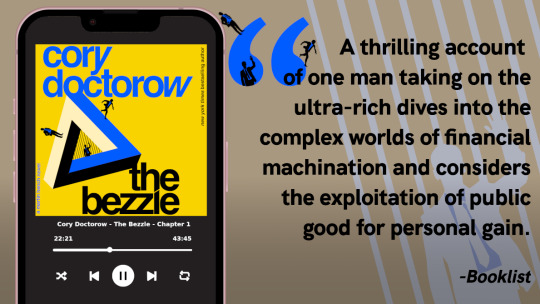#Privacy and Technology
Explore tagged Tumblr posts
Text
Speaking from the perspective of someone who's worked in the tech industry for thirty years, the thing about personal data privacy policies for online services is that, nearly without exception, they contain provisos allowing your data to be shared with third parties to the extent that doing so is necessary to provide the service that's being offered – and, critically, unless they're literally forced to do so by law, who these third parties are and what constitutes "necessary" sharing will not be defined. This vagueness is routinely exploited by entering into sham partnerships with interested parties who, on paper, are providing the data holder with unspecified consulting services, thereby allowing the data in question to be shared with practically anyone while adhering to the letter of any relevant privacy policy.
All of which is to say that 23andMe has absolutely been selling your genetic data this whole time. The only reason they're asking a judge for official permission to do so now is because being in bankruptcy means they actually need to explain what it is that they're doing.
2K notes
·
View notes
Text






(from The Mitchells vs. the Machines, 2021)
#the mitchells vs the machines#data privacy#ai#artificial intelligence#digital privacy#genai#quote#problem solving#technology#sony pictures animation#sony animation#mike rianda#jeff rowe#danny mcbride#abbi jacobson#maya rudolph#internet privacy#internet safety#online privacy#technology entrepreneur
12K notes
·
View notes
Text
when you're actually inside the cyberpunk dystopia it still feels... normal.
392 notes
·
View notes
Text

The startup Eight Sleep Inc. makes a temperature-controlled, water-filled mattress cover system popular with Silicon Valley execs and body optimizers who say that sleeping at the perfect temperature gives them the ideal rest. The bed cover costs more than $2,000 and requires an internet connection to work. To power the temperature adjustments – which the company now says can be finessed with AI insights – Eight Sleep beds need to be online. But one researcher says he’s found ways that Eight Sleep’s engineers can theoretically snoop on customers’ bed activity. He says it’s just the latest example of the way tech companies today are often pushing everyday products to be overly engineered, unnecessarily internet-connected and reliant on a recurring subscription. Dylan Ayrey, the co-founder and chief executive officer of Truffle Security Co., said he initially bought an Eight Sleep system to help with insomnia. He joins users such as Meta Platforms Inc. CEO Mark Zuckerberg, biohacker Bryan Johnson and Andrew Huberman, the tech industry’s favorite health guru. Elon Musk has also praised the bed. (The admiration is apparently mutual: Eight Sleep CEO Matteo Franceschetti shipped bed covers to DOGE this month and wrote on X, “@eIonmusk us if you need more.”) When Ayrey looked at the bed’s firmware, he was surprised to see that it appeared to have a backdoor that would allow the company’s engineers to remote into any bed and run code on it without oversight. Ayrey hypothesized that, for example, if your ex worked at Eight Sleep, they could find out when you’re sleeping at home – or when you’re not – and whether you’re sleeping alone or with someone else. He compared it to Uber Technologies Inc.’s controversial “God View,” an internal system in which employees previously could track individual riders using their service. It also evokes the way thousands of Amazon.com Inc. employees could listen to sound clips recorded through Alexa devices.
[ Source ]
119 notes
·
View notes
Text
Imagine 🤔 this 👆
#pay attention#educate yourselves#educate yourself#reeducate yourselves#knowledge is power#reeducate yourself#think about it#think for yourselves#think for yourself#do your homework#do some research#do your research#do your own research#government lies#government secrets#government corruption#truth be told#lies exposed#evil lives here#news#wtf#wth#could it be#evil#no privacy#technology#possible future#stranger than fiction
132 notes
·
View notes
Text
For those living in one of the 22 states where abortion is banned or heavily restricted, the internet can be a lifeline. It has essential information on where and how to access care, links to abortion funds, and guidance on ways to navigate potential legal risks. Activists use the internet to organize and build community, and reproductive healthcare organizations rely on it to provide valuable information and connect with people in need.
But both Republicans and Democrats in Congress are now actively pushing for federal legislation that could cut youth off from these vital healthcare resources and stifle online abortion information for adults and kids alike.
This summer, the U.S. Senate passed the Kids Online Safety Act (KOSA), a bill that would grant the federal government and state attorneys general the power to restrict online speech they find objectionable in a misguided and ineffective attempt to protect kids online. A number of organizations have already sounded the alarm on KOSA’s danger to online LGBTQ+ content, but the hazards of the bill don’t stop there.
KOSA puts abortion seekers at risk. It could easily lead to censorship of vital and potentially life-saving information about sexual and reproductive healthcare. And by age-gating the internet, it could result in websites requiring users to submit identification, undermining the ability to remain anonymous while searching for abortion information online.
Abortion Information Censored
As EFF has repeatedly warned, KOSA will stifle online speech. It gives government officials the dangerous and unconstitutional power to decide what types of content can be shared and read online. Under one of its key censorship provisions, KOSA would create what the bill calls a “duty of care.” This provision would require websites, apps, and online platforms to comply with a vague and overbroad mandate to prevent and mitigate “harm to minors” in all their “design features.”
KOSA contains a long list of harms that websites have a duty to protect against, including emotional disturbance, acts that lead to bodily harm, and online harassment, among others. The list of harms is open for interpretation. And many of the harms are so subjective that government officials could claim any number of issues fit the bill.
This opens the door for political weaponization of KOSA—including by anti-abortion officials. KOSA is ambiguous enough to allow officials to easily argue that its mandate includes sexual and reproductive healthcare information. They could, for example, claim that abortion information causes emotional disturbance or death, or could lead to “sexual exploitation and abuse.” This is especially concerning given the anti-abortion movement’s long history of justifying abortion restrictions by claiming that abortions cause mental health issues, including depression and self-harm (despite credible research to the contrary).
As a result, websites could be forced to filter and block such content for minors, despite the fact that minors can get pregnant and are part of the demographic most likely to get their news and information from social media platforms. By blocking this information, KOSA could cut off young people’s access to potentially life-saving sexual and reproductive health resources. So much for protecting kids.
KOSA’s expansive and vague censorship requirements will also affect adults. To avoid liability and the cost and hassle of litigation, websites and platforms are likely to over-censor potentially covered content, even if that content is otherwise legal. This could lead to the removal of important reproductive health information for all internet users, adults included.
A Tool For Anti-Choice Officials
It’s important to remember that KOSA’s “duty of care” provision would be defined and enforced by the presidential administration in charge, including any future administration that is hostile to reproductive rights. The bill grants the Federal Trade Commission, majority-controlled by the President’s party, the power to develop guidelines and to investigate or sue any websites or platforms that don’t comply. It also grants the Executive Branch the power to form a Kids Online Safety Council to further identify “emerging or current risks of harms to minors associated with online platforms.”
Meanwhile, KOSA gives state attorneys general, including those in abortion-restrictive states, the power to sue under its other provisions, many of which intersect with the “duty of care.” As EFF has argued, this gives state officials a back door to target and censor content they don’t like, including abortion information.
It’s also directly foreseeable that anti-abortion officials would use KOSA in this way. One of the bill’s co-sponsors, Senator Marsha Blackburn (R-TN), has touted KOSA as a way to censor online content on social issues, claiming that children are being “indoctrinated” online. The Heritage Foundation, a politically powerful organization that espouses anti-choice views, also has its eyes on KOSA. It has been lobbying lawmakers to pass the bill and suggesting that a future administration could fill the Kids Online Safety Council with “representatives who share pro-life values.”
This all comes at a time when efforts to censor abortion information online are at a fever pitch. In abortion-restrictive states, officials have already been eagerly attempting to erase abortion from the internet. Lawmakers in both South Carolina and Texas have introduced bills to censor online abortion information, though neither effort has yet to be successful. The National Right to Life Committee has also created a model abortion law aimed at restricting abortion rights in a variety of ways, including digital access to information.
KOSA Hurts Anonymity Online
KOSA will also push large and important parts of the internet behind age gates. In order to determine which users are minors, online services will likely impose age verification systems, which require everyone—both adults and minors—to verify their age by providing identifying information, oftentimes including government-issued ID or other personal records.
This is deeply problematic for maintaining access to reproductive care. Age verification undermines our First Amendment right to remain anonymous online by requiring users to confirm their identity before accessing webpages and information. It would chill users who do not wish to share their identity from accessing or sharing online abortion resources, and put others’ identities at increased risk of exposure.
In a post-Roe United States, in which states are increasingly banning, restricting, and prosecuting abortions, the ability to anonymously seek and share abortion information online is more important than ever. For people living in abortion-restrictive states, searching and sharing abortion information online can put you at risk. There have been multiple instances of law enforcement agencies using digital evidence, including internet history, in abortion-related criminal cases. We’ve also seen an increase in online harassment and doxxing of healthcare professionals, even in more abortion-protective states.
Because of this, many organizations, including EFF, have tried to help people take steps to protect privacy and anonymity online. KOSA would undercut those efforts. While it’s true that our online ecosystem is already rich with private surveillance, age verification adds another layer of mass data collection. Online ID checks require adults to upload data-rich, government-issued identifying documents to either the website or a third-party verifier, creating a potentially lasting record of their visit to the website.
For abortion seekers taking steps to protect their anonymity and avoid this pervasive surveillance, this would make things all the more difficult. Using a public computer or creating anonymous profiles on social networks won’t keep you safe if you have to upload ID to access the information you need.
We Can Still Stop KOSA From Passing
KOSA has not yet passed the House, so there’s still time to stop it. But the Senate vote means that the House could bring it up for a vote at any time, and the House has introduced its own similarly flawed version of KOSA. If we want to protect access to abortion information online, we must organize now to stop KOSA from passing.
#KOSA#stop kosa#privacy#censorship#call to action#collective action#reproductive rights#reproductive health#reproductive freedom#reproductive justice#online privacy#internet#technology
185 notes
·
View notes
Text
#JOIN THE FEDIVERSE#degoogle#big tech#internet privacy#cybersecurity#decentralization#social media#technology#links#ref
53 notes
·
View notes
Text





for a website that bans queer selfies bc they 'might' be sexually explicit these ai ads have zero chill
#let's see if this post gets taken down despite the ads being everywhere all of a sudden#ai#tumblr#staff#aicupid#chatbot#so fucked#big tech#technology#artificial intelligence#social media#surveillance capitalism#privacy
17 notes
·
View notes
Text

Big Fryer is Watching
This cartoon refers to a study by a British consumer rights group called Which? (that's their name), that examined unnecessary data harvesting by "smart" devices, including air fryers. Certain brands wanted permission to record audio on users' phones and track precise location, and one brand connected its app to trackers from Facebook and Tiktok. None of this digital access is actually necessary for the fryer to function.
Receive my weekly newsletter and keep this work sustainable by joining the Sorensen Subscription Service! Also on Patreon.
42 notes
·
View notes
Text
The cogent documentary, “Surveilled,” now available on HBO, tracks journalist Ronan Farrow as he investigates the proliferation and implementation of spyware, specifically, Pegasus, which was created by the Israeli company NSO Group. The company sells its product to clients who use it to fight crime and terrorism. It is claimed that Pegasus was instrumental in helping capture Mexican drug lord, Joaquín “El Chapo” Guzman. However, there are also reports that NSO’s products are being used to target journalists, human rights activists and political dissidents.
. . .
Farrow: I put up a piece in The New Yorker this week. It was fascinating to talk to experts in the privacy law space who are really in a high state of alarm right now. The United States, under administrations from both parties, has flirted with this technology in ways that is alarming. Under the first Trump administration, they bought Pegasus. They claimed they were buying it to test it and see what our enemies were doing, and The New York Times later sued them for more information and found really persuasive evidence that the FBI wanted to operationalize that in American law enforcement investigations.
youtube
In September, the Department of Homeland Security (D.H.S.) signed a two-million-dollar contract with Paragon, an Israeli firm whose spyware product Graphite focusses on breaching encrypted-messaging applications such as Telegram and Signal. Wired first reported that the technology was acquired by Immigration and Customs Enforcement (ICE)—an agency within D.H.S. that will soon be involved in executing the Trump Administration’s promises of mass deportations and crackdowns on border crossings. A source at Paragon told me that the deal followed a vetting process, during which the company was able to demonstrate that it had robust tools to prevent other countries that purchase its spyware from hacking Americans—but that wouldn’t limit the U.S. government’s ability to target its own citizens. The technology is part of a booming multibillion-dollar market for intrusive phone-hacking software that is making government surveillance increasingly cheap and accessible. In recent years, a number of Western democracies have been roiled by controversies in which spyware has been used, apparently by defense and intelligence agencies, to target opposition politicians, journalists, and apolitical civilians caught up in Orwellian surveillance dragnets.
Now Donald Trump and incoming members of his Administration will decide whether to curtail or expand the U.S. government’s use of this kind of technology. Privacy advocates have been in a state of high alarm about the colliding political and technological trend lines.
“It’s just so evident—the impending disaster,” Emily Tucker, the executive director at the Center on Privacy and Technology at Georgetown Law, told me. “You may believe yourself not to be in one of the vulnerable categories, but you won’t know if you’ve ended up on a list for some reason or your loved ones have. Every single person should be worried.”
40 notes
·
View notes
Text
The REAL AI automation threat to workers

I'm Kickstarting the audiobook for The Bezzle, the sequel to Red Team Blues, narrated by @wilwheaton! You can pre-order the audiobook and ebook, DRM free, as well as the hardcover, signed or unsigned. There's also bundles with Red Team Blues in ebook, audio or paperback.

Long before the current wave of AI hype, we were being groomed for automation panics with misleading stories. Remember this one? "'Truck driver' is the most common job in America. Self-driving trucks are just around the corner. How can we prevent America's army of truckers from turning into a howling mob when the robots steal their jobs?"
https://futurism.com/millions-of-jobs-are-at-risk-but-their-loss-could-be-for-the-greater-good
It was absolute nonsense. First of all, "truck driver" isn't a particularly common job in America! The BLS lumps together all cargo vehicle drivers under a single classification. The category error here was thinking that every delivery van driver, furniture mover, and courier is behind the wheel of a big rig, cracking wise on a CB radio as they tear up the interstate.
But what about automation threats? It's possible that if we redesigned the interstates to give 16 wheelers their own separated lanes, and then set them to following one another, that they could traverse long distances in that way. Congratulations, you've just invented a shitty, failure-prone train.
"Shitty train AI" does not threaten the job of the vast number of people the BLS classifies as "truck drivers." For one thing, "shitty train AI" isn't going to pilot a UPS van around the streets of a busy city with other road users. Sure, a few robotaxi companies have bamboozled city governments into conscripting the city's residents into an uncontrolled murderbot experiment. These are not going well:
https://www.cbsnews.com/sanfrancisco/news/9-key-leaders-depart-gms-cruise-amid-ongoing-investigation-into-san-francisco-incident/
More than $100b has been set on fire chasing the robotaxi dream, and the result is most charitably described as a technological curiosity, requiring 1.5 high-waged remote technicians to replace each low-waged driver:
https://pluralistic.net/2022/10/09/herbies-revenge/#100-billion-here-100-billion-there-pretty-soon-youre-talking-real-money
But even if we could perfect this technology, robots still wouldn't replace all those "truckers" who drive delivery vans (to say nothing of moving vans!). The hard part of driving a UPS van isn't just getting it from place to place – it's getting the parcel into the place. The robo-van would still need at least one person to get the parcel from the back of the van and into the reception desk, porch, or other delivery zone. It's not going to fire those parcels at your door with a catapult. It's also not going to deliver them by drones. Drone delivery is another one of those historical curiosities, capable of delivering a very narrow range of parcels, under even narrower circumstances:
https://pluralistic.net/2021/08/05/comprehensive-sex-ed/#droned
If all UPS delivered was lightweight, non-fragile rectangular parcels ordered by people with large, unobstructed back yards, then sure. Congrats, you've just created the world's least-useful parcel delivery service!
https://arstechnica.com/gadgets/2022/06/amazon-drone-delivery-service-seeks-faa-approval-to-launch-in-2022/
All that said, the big rig drivers probably don't need to worry about robots stealing their jobs. It's not even clear that "shitty train" is within our technological grasp, but even if it is, there's yet another problem with the AI automation trucker jobpocalypse: "trucker" is already one of the worst jobs in America:
https://www.usatoday.com/pages/interactives/news/rigged-forced-into-debt-worked-past-exhaustion-left-with-nothing/
It's hard to overstate just how fucking terrible it is to be a trucker. Truckers are trapped in abusive debt holes by their employers – who misclassify their workforce as "contractors" in a bid to sidestep labor law. Shriven of any labor rights, truckers are forced into the most ghastly, body-destroying, family-wrcking, financially precarious existence imaginable.
You can drive a truck for years, give almost all of the money you earn back to your employer (who denies that you're their employee) to pay back the usurious loan for your truck. Then, your employer can underschedule for shifts so that you miss a loan payment, and they can repo your truck and keep the six-figure repayment you've already made to them, leaving you destitute.
They can force you to work for hours – days! – without pay while you wait for loading and dispatch. They can make you drive long past the point of safety, then, if (when) you get into a wreck, they can fine you for not taking the mandated rest breaks.
Now, these drivers aren't about to be replaced by AI – but that doesn't mean that AI won't affect their jobs. Commercial drivers are among the most heavily surveilled workers in the country. Amazon's drivers (whom Amazon misclassifies as subcontractors) have their eyeballs monitored by AI;
https://pluralistic.net/2022/04/17/revenge-of-the-chickenized-reverse-centaurs/
AIs monitor the voices of the (primarily Black, primarily female) workforce at Arise – homeworkers who field customer service calls for blue-chip companies like Carnival Cruises and Disney. They're listening for unruly children or pets in the background, and workers who fail to muffle these dependents lose the contracts they have to pay to train for:
https://pluralistic.net/2021/01/22/paperback-writer/#toothless
And AI monitors the conduct of workers on temp-work apps. If a worker is dispatched to a struck workplace and refuses to cross the picket-line, the AI boss fires you and blacklists you from future jobs for refusing to robo-scab:
https://pluralistic.net/2023/07/30/computer-says-scab/#instawork
Writing in The Guardian, Steven Greenhouse describes the AI-enabled workplace, where precarious, often misclassified workers are monitored, judged, and fined by algorithms:
https://www.theguardian.com/technology/2024/jan/07/artificial-intelligence-surveillance-workers
Whether it's the robot that gets you disciplined for sending an email with the word "union" in it or the robot that takes money out of your paycheck if you take a bathroom break, AI has come for the workplace with a vengeance.
Here's a supreme irony: nearly all of the beneficial applications for AI require that AI be used to help workers, not replace them, which is absolutely not how AI is used in the workplace. An AI that helps radiologists by giving them a second opinion might help them find tumors on x-rays, but that's a tool that reduces the number of scans a radiologist processes in a shift, by making them go back and reconsider the scans they've already processed:
https://locusmag.com/2023/12/commentary-cory-doctorow-what-kind-of-bubble-is-ai/
But AI's sales pitch is not "Buy an AI tool and increase your costs while increasing your accuracy." The pitch for AI is "buy and AI and save money by firing workers." Given how bad AIs are at replacing humans, this is a bad deal all around, both for the worker who loses their job and the customer who gets the substandard product the AI makes.
There is a very limited slice of applications where an AI could make a lot of money for a company that deploys it, without costing that company anything when the AI screws up. For example, AI is a really good tool for fraud! Rather than paying people to churn out millions of variations on a phishing email, you can get an AI to do it. If the AI writes a bad phishing email, it's OK, since nearly all recipients of even good phishing emails delete them. What's more, no one will fine you or publish an op-ed demanding that your board of directors fire you if you buy an incompetent AI to commit fraud. Fraud is a high-value, low-consequence environment for using AI.
Another one of those applications is managing precarious workers who don't have labor rights. If the AI unfairly docks your worker's wages, or forces them to work until they injure themselves or others, or decides that their eyeball movements justify firing them, those workers have no recourse. That's the whole point of pretending that your employees are contractors: so you can violate labor law with impunity!
But that's not the ironic part. The ironic part is that "being a shitty boss" is the one AI application that companies are willing to increase their net spending on. No one buys an eyeball-monitoring AI so they can fire a manager. This is the one place where AI is there to augment, rather than replace, an employee.
This makes AI-based bossware subtly different from other forms of Taylorism, the "scientific management" fad of the early 20th century that saw management consultants choreographing the postures and movements of workers to satisfy the aesthetic fetishes of their employers:
https://pluralistic.net/2021/02/24/gwb-rumsfeld-monsters/#bossware
The pseudoscientific cod-ergonomics of the 1900s was demeaning and even dangerous, but it wasn't automated, and if it increased worker output, this was incidental to the real purpose of making workers move like the machine-cogs their bosses reassured themselves they were:
https://pluralistic.net/2022/08/21/great-taylors-ghost/#solidarity-or-bust
Every AI panic is a way of deflecting attention from the real, grimy, here-and-now ways that AI is destroying our lives by demanding that we entertain nonsensical science fiction claims about large, shiny existential risks that AI might present in the future.
The "X-risk" of the spicy autocomplete chatbot waking up and using its newfound sentience to turn us all into paperclips is nonsense. Adding words to the plausible sentence generator doesn't turn it into a superintelligence for the same reason that selectively breeding faster horses doesn't lead to locomotives:
https://locusmag.com/2020/07/cory-doctorow-full-employment/
But there is a way that AI could destroy the human race! The carbon footprint and water consumption associated with training and operating large-scale models are significant contributors to the climate emergency, which threatens the habitability of the only planet in the known universe capable of sustaining human life:
https://www.forbes.com/sites/federicoguerrini/2023/04/14/ais-unsustainable-water-use-how-tech-giants-contribute-to-global-water-shortages/
Likewise, AI isn't going to replace you at work. But it's already augmenting your shitty boss's ability to rip you off, torment you, maim you and even kill you in order to eke out a few more basis points for the next shareholder report.
Science fiction is a fun and useful way to tell parables about our current technologies. But it's not a roadmap for the future. The fact that sf writers like me found AIs as useful measures to describe Earth's dominant artificial life form – the limited liability corporation – doesn't mean that superhuman AIs should – or can – be created.

Back the Kickstarter for the DRM-free audiobook of The Bezzle, read by Tumblr's own @wilwheaton!

If you'd like an essay-formatted version of this post to read or share, here's a link to it on pluralistic.net, my surveillance-free, ad-free, tracker-free blog:
https://pluralistic.net/2024/01/11/robots-stole-my-jerb/#computer-says-no

Image: Cryteria (modified) https://commons.wikimedia.org/wiki/File:HAL9000.svg
CC BY 3.0 https://creativecommons.org/licenses/by/3.0/deed.en
#pluralistic#labor#ai#disciplinary technology#bossware#automation#robots stole my jerb#surveillance#privacy first
224 notes
·
View notes
Text
Something that has been on my mind lately: revolution.
What does that really look like?
How does that work right now?
I blame my current media consumption. Rewatching Andor. Rereading the hunger games and reading its subsequent prequels. Rewatching Anon. Binging Leverage and Person of Interest. Hunting down old copies of Uglies and Maximum Ride. Rewatching Equilibrium. Going through old research for cyberpunk and solarpunk worlds I built for me.
I feel a huge dissatisfaction with the world. While not as extreme as the dystopian worlds above, so many tiny injustices piling up. A 50 hour work week just to make ends meet. Pausing a movie to catch a detail but only seeing an ad. Watching multiple sources pull different details out of context to highlight their narrative. A new system at work to “maximize oversight”. Another company mining my data.
And unlike most of the dystopias, there is no one tyrannical entity behind it all. A single place to focus my fury. It’s not just an Evil Corporation out to make maximum profits. It’s not a Totalitarian Government determined to control a populous.
It is multiple corporations trying to make a profit. It is different factions of government all trying to get their agenda pushed. It is all these different companies and parties and individuals scrambling for power and control and safety.
I just want to run away from it all.
When I was younger, I wanted the power to change the world. I wanted to be the Chosen One; to defeat a Great Evil and stop all the wrongs. I sought out ways to increase my power and influence, sure I would use them for the good and safety of everyone.
Which is exactly how you become the Great Evil that must be defeated.
Now I just want enough money and enough power to be left alone. Enough influence to get the things I need.
I see no way to achieve this in the world I currently live in. I want the powers that be to leave me alone. Yet in their version of the world, that is a threat. Anyone or anything outside of their sphere of influence, outside of their grasp, is a danger to the systems that currently hold our world in place.
There’s no one place to concentrate the fight, to rebel against. So many people say pick one thing and fight that. But there are too many things I care deeply for. Too many injustices to push back against. But that just plays into their hands. They want me hopeless. They want me overwhelmed. They want me to be apathetic and inactive.
I just need to find a way forward.
I’ll let you know when I find it.
#yelling into the void#revolution#andor#the hunger games#sotr#bosbas#anon movie#leverage#person of interest#uglies#solarpunk#cyberpunk#invasive technology#self-governance#All revolutions are impossible until they happen. Then they become inevitable#Freedom is a pure idea#you invade my privacy it’s nothing#I try to get it back it’s a crime#it’s not that I have something to hide I have nothing I want you to see#we can’t control what we can’t see#Maybe they didn't want you to realize that every civilization has its weaknesses#When everything is over when the worst has happened there's still one thing left in Pandora's Box: hope.
14 notes
·
View notes
Text

#surveillance capitalism#surveillance authoritarianism#big tech#social media#elon musk#donald trump#the guardian#twitter#meta#amazon#jeff bezos#silicon valley#resistance#activism#protest#direct action#signal#us politics#privacy#artificial intelligence#technology#google#authoritarianism#facebook#whatsapp#instagram
28 notes
·
View notes
Text









˶ᵔ ᵕ ᵔ˶
#stickers#sticker design#sticker sheet#sticker shop#stationery#vending machine#microsoft#privacy#intel#platform#technology#scarab#beetleposting#caterpillar#moth#insect#bug#yotsuba#yotsubato#mangacap#manga panel#anime and manga#anime#shoujo manga#manga icons#manga cap#manga#anime manga#hamster#shiba inu
27 notes
·
View notes
Text
Everything is public now, potentially: one’s thoughts, one’s photos, one’s movements, one’s purchases. There is no privacy and apparently little desire for it in a world devoted to non-stop use of social media. Every minute, every second, has to be spent with one’s device clutched in one’s hand. Those trapped in this virtual world are never alone, never able to concentrate and appreciate in their own way, silently. They have given up, to a great extent, the amenities and achievements of civilization: solitude and leisure, the sanction to be oneself, truly absorbed, whether in contemplating a work of art, a scientific theory, a sunset, or the face of one’s beloved.
— The Machine Stops (Oliver Sacks)
#oliver sacks#technology#digital technology#computing#internet#social#privacy#sociology#psychology#philosophy#solitude#leisure#art
256 notes
·
View notes
Text
Palantir co-founder Peter Thiel's strategy for domination is just about as sinister as it gets.
More Perfect Union
#tiktok#more perfect union#tech bros#surveillance#surveillance state#technology#elections#voting#women's suffrage#human rights#techno feudalism#CIA#online privacy#democracy#civil rights#internet
18 notes
·
View notes